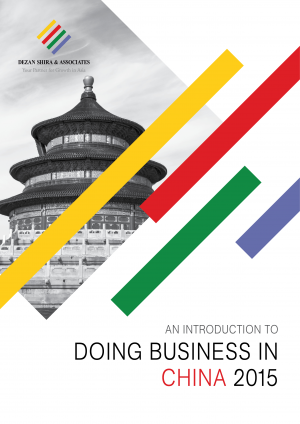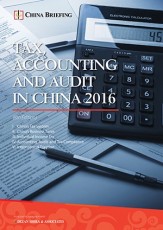China’s New NGO Law and its Impact on FDI into the Higher Education Industry
By Dezan Shira & Associates
Editors: Mia Yiqiao Jing and Samuel Wrest
 China’s recently released law to regulate the activities of foreign non-governmental organizations (NGOs) has raised fresh doubts regarding foreign investment into China’s higher education industry. Set to come into effect in January next year, the law contains provisions that will further regulate education institutions with operations in the country and affect the entry strategy of new players looking to enter the market.
China’s recently released law to regulate the activities of foreign non-governmental organizations (NGOs) has raised fresh doubts regarding foreign investment into China’s higher education industry. Set to come into effect in January next year, the law contains provisions that will further regulate education institutions with operations in the country and affect the entry strategy of new players looking to enter the market.
Powered by China’s economic development and a rapid increase in university student enrollment, there has been a sharp rise in interest from foreign education providers to invest in China since the turn of the century. The industry is potentially hugely profitable, with China’s increasingly affluent population willing to pay more to enroll at foreign education institutions that are generally seen as being more prestigious than domestic ones. However, Sino-foreign education institutions have long been subject to special scrutiny in China, resulting in 70 percent of applications for establishment being rejected in 2011, and the new law is set to further complicate the industry for foreign education providers.
The Sino-foreign Education Industry
As of March 9, 2015, there were 60 Sino-foreign institutions and 1, 052 projects active in China’s higher education industry, with a total of 30 countries contributing to foreign education resources in the market. According to the Ministry of Education (MOE), the UK is the biggest source of foreign education investment with 233 joint programs with Chinese universities, while the U.S. takes second place with 169 programs. Approximately 94.5 percent of foreign investors chose to form education projects in Chinese universities, within which computer science, accounting, and global economics are the three most popular undergraduate programs. Provinces with a high GDP per capita, such as Beijing, Shanghai, Zhejiang and Jiangsu province, rank highest for the number of Sino-foreign education programs.
![]() RELATED: Business Advisory Services from Dezan Shira & Associates
RELATED: Business Advisory Services from Dezan Shira & Associates
Current Regulations on Foreign Investment
There are currently three ways to enter the Chinese higher education industry: as an independent institution in cooperation with a Chinese university, a college affiliated to a Chinese university, or a joint education program. Upon establishment, both the foreign and Chinese parties must submit several different kinds of official documents, including identification, criminal records, and sources of funding.
According to the Regulations on Foreign-Chinese Cooperation in Running Schools, the president or principal administrator must be a Chinese national, who will decide and manage the board of trustees, implement financial budgets and activities, and take charge of quality control. The MOE oversees any changes made by the joint institution, and any imported teaching materials must be scrutinized and receive government approval.
The NGO Management Law and Sino-foreign Education Industry
While Sino-foreign education institutions are not the direct target of China’s new NGO Management Law, the law contains provisions that will further restrict their involvement in educational exchange in China.
According to the new management law, the entry of for-profit foreign schools will be strictly prohibited. Due to the vague definition of “non-governmental” and “non-profit” foreign NGOs, there is also a risk that the marketing and funding activities of not-for-profit education providers will also be affected, as the law requires all financial documents remain available to the State Council.
The law states that, in addition to receiving supervision from local authorities, foreign NGOs will also be reviewed by the Public Security Bureau. This will extend to foreign education providers, with activities such as registration, licensing, recruitment, operations, and education programs all needing to be disclosed.
Complying with the NGO Management Law
Because the NGO Management law doesn’t clearly indicate which practices are considered “for profit”, foreign investors should communicate with the MOE to ensure that their planned education programs and events don’t fall foul of regulations. It is also recommended that foreign investors regularly communicate with local governments in order to understand their area-specific development strategies, targets, and how education programs can boost local economic development, which will help alleviate any scrutiny.
Historically, most Sino-foreign universities have been subsidized by local governments. For example, the Ningbo government provided RMB 1.5 billion for the founding of The University of Nottingham Ningbo China, and the Pudong government gave away land for the building of NYU Shanghai. Mutual understanding is therefore key between foreign investors and local governments to reduce expenditure on the initial investment, and this will be especially true when the NGO Management Law comes into effect
Prospect for the Future
In line with China’s 2010-2020 Innovation Society Plan, Sino-foreign education will continue to be seen as a means to boost China’s knowledge economy.
Traditionally, Sino-foreign universities have targeted China’s more prosperous coastal cities. However, the Chinese government is now putting more emphasis on providing high-quality education services to children living in rural areas, or to migrant families who have comparably lower household income. In addition, the MOE is giving more support to local governments from Central and Western China in education development, with plans in place for them to make up 44 percent of the total number of Sino-foreign programs. This initiative gives foreign investors more opportunities in a less saturated market.
With China targeting 20 percent of its energy mix to be clean before 2030, the Chinese government is also working to promote expertise in atmospheric science, disaster management, ecology, and environmental engineering. Joint education programs targeting these subjects are therefore expected to have a promising future in the country’s higher education industry.
While the NGO Management Law stands to further impede foreign investment into China’s higher education market, the Chinese Sino-foreign education industry is still expected to expand overall. In order to ensure that their investments are worthwhile, foreign education providers will have to look closely at a number of influencing factors, including the location of their institution or program, the subjects that it teaches, and the setup and structure of their partner(s).
|
About Us Asia Briefing Ltd. is a subsidiary of Dezan Shira & Associates. Dezan Shira is a specialist foreign direct investment practice, providing corporate establishment, business advisory, tax advisory and compliance, accounting, payroll, due diligence and financial review services to multinationals investing in China, Hong Kong, India, Vietnam, Singapore and the rest of ASEAN. For further information, please email china@dezshira.com or visit www.dezshira.com. Stay up to date with the latest business and investment trends in Asia by subscribing to our complimentary update service featuring news, commentary and regulatory insight. |
![]()
 An Introduction to Doing Business in China 2015
An Introduction to Doing Business in China 2015
Doing Business in China 2015 is designed to introduce the fundamentals of investing in China. Compiled by the professionals at Dezan Shira & Associates, this comprehensive guide is ideal not only for businesses looking to enter the Chinese market, but also for companies that already have a presence here and want to keep up-to-date with the most recent and relevant policy changes.
Establishing & Operating a Business in China 2016
Establishing & Operating a Business in China 2016, produced in collaboration with the experts at Dezan Shira & Associates, explores the establishment procedures and related considerations of the Representative Office (RO), and two types of Limited Liability Companies: the Wholly Foreign-owned Enterprise (WFOE) and the Sino-foreign Joint Venture (JV). The guide also includes issues specific to Hong Kong and Singapore holding companies, and details how foreign investors can close a foreign-invested enterprise smoothly in China.
 Tax, Accounting, and Audit in China 2016
Tax, Accounting, and Audit in China 2016
This edition of Tax, Accounting, and Audit in China, updated for 2016, offers a comprehensive overview of the major taxes that foreign investors are likely to encounter when establishing or operating a business in China, as well as other tax-relevant obligations. This concise, detailed, yet pragmatic guide is ideal for CFOs, compliance officers and heads of accounting who must navigate the complex tax and accounting landscape in China in order to effectively manage and strategically plan their China-based operations.
- Previous Article Turning up the Heat: Understanding China’s Regional High Temperature Allowance
- Next Article China-Israel Relations: Why the Tech Industry is Key to Bilateral Trade and Investment










